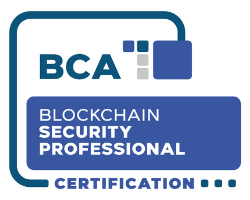Certified Blockchain Security Professional


Certified Blockchain Security Professional
THE AVERAGE BLOCKCHAIN SECURITY MANAGER SALARY IS $136,625 – ZIPRECRUITER
Blockchains provide a decentralized platform for data processing and storage, potentially revolutionizing many business processes. However, blockchain-based platforms are only useful if they are secure. Blockchains use asymmetric cryptography to ensure the authenticity and integrity of transactions stored on the distributed ledger.
An attacker with access to the private key of a blockchain account can steal cryptocurrency and interact with smart contracts on its behalf. Smart contracts extend the functionality of the blockchain by allowing programs to run on top of the distributed ledger. However, as smart contracts become more common and powerful, vulnerabilities in these contracts have far-reaching implications.
Enroll in this course to learn about the potential vulnerabilities and security risks that exist at each level of the blockchain ecosystem, learn best practices for managing blockchain account keys, and about common smart contract vulnerabilities and how to identify and remediate them.
QUESTIONS WE’LL EXPLORE
- What security benefits do blockchain’s cryptography provide?
- How do blockchain consensus algorithms work?
- How does blockchain’s theoretical and real-world security differ?
- What are potentially exploitable vulnerabilities in smart contracts?
- What are the pros and cons of different blockchain architectures?
- How does blockchain technology affect regulatory compliance?
- What are the benefits of asymmetric cryptography?
- How do blockchain and public key cryptography work?
- Do ‘cold’ and ‘hot’ wallets differ?
- Whare are key generation best practices?
- Why is private key security important?
- How does private key security fail?
- How are exchanges and online wallets both a benefit and risk?
- What vulnerabilities do smart contracts share with other programs?
- How does the design of the blockchain affect smart contract security?
- What vulnerabilities exist in particular smart contract platforms?
- How does DeFi create new potential vulnerabilities?
- How can a smart contract security audit identify vulnerabilities?
Courses in this Certificate Program
- 60 Total Hours
- OnDemand: 40 Hours
- LIVE Instructor: 20 Hours
- Tuition: $2,995
| Courses in this Program | Hours | Delivery Method |
|---|---|---|
| Student Orientation | 1 Hour | Live Online Instructor Led |
| Blockchain Foundations | 15 Hours | OnDemand - Instructor Supported |
| Key Management | 5 Hours | OnDemand - Instructor Supported |
| Blockchain Security | 10 Hours | OnDemand - Instructor Supported |
| Blockchain Security LIVE Workshop | 5 Hours | Live Online Instructor Led |
| Smart Contract Security | 10 Hours | OnDemand - Instructor Supported |
| Smart Contract Security LIVE Workshop | 5 Hours | Live Online Instructor Led |
| Blockchain LAB | 5 Hours | Live Online - Instructor Supported |
| Live Instructor AMA - Weekly | 5 Hours | Live Online Instructor Led |
- Enroll Now
- Download Syllabus
- RSVP for Info Session
Upcoming LIVE Instruction Dates
Blockchain Student Orientation – Tuesday September 6th @ 12 PM EST
12 PM to 1 PM Eastern Time – LIVE Online Join alongside your blockchain student peers for the upcoming Student Orientation, held monthly! This is not a required session but… Continue reading Blockchain Student Orientation – Tuesday September 6th @ 12 PM EST
Instructor AMA – LIVE Weekly – FRIDAY – SEPTEMBER 9th @ 1 PM Eastern
1 PM to 2:30 PM Eastern Time (10 AM to 2:30 PM Pacific Time) You join weekly to ask questions, learn alongside others, and network with blockchain enthusiasts like yourself. … Continue reading Instructor AMA – LIVE Weekly – FRIDAY – SEPTEMBER 9th @ 1 PM Eastern
Blockchain LAB – Friday September 16th at 12 PM EST
12 PM to 2:30 PM Eastern Time (9 AM to 11:30 AM Pacific Time) Blockchain LAB with SIMBA Chain No-code and low-code software DYNAMIC APIS The SIMBA Blocks platform… Continue reading Blockchain LAB – Friday September 16th at 12 PM EST
Blockchain Security LIVE – Monday – September 19th
12 PM to 5 PM Eastern Time (9 AM to 2 PM Pacific Time) Attend LIVE blockchain security training alongside your self-paced course.
Smart Contract Security LIVE – Tuesday – September 20th
12 PM to 5 PM Eastern Time (9 AM to 2 PM Pacific Time) Attend LIVE smart contract security training alongside your self-paced course.
Blockchain Security Program Objectives
Upon successful completion of this intensive program, participants will be able to:
Understand the security of blockchain’s fundamental cryptography.
Understand the underlying theory behind public key cryptography
Explore applications of asymmetric cryptography in blockchain
Compare the various methods of private key generation
Contrast various private key storage methodologies
Articulate common cryptographic key management mistakes
Explore the advantages and disadvantages of blockchain consensus algorithms.
Identify the security impacts of blockchain infrastructure, such as nodes and networks.
Discuss the security of smart contracts and their applications.
Define how to develop a secure blockchain-based solution for a business case.
Understand the challenges of smart contract security
Explore common smart contract vulnerabilities via sample code and case studies
Identify best practices for mitigating common smart contract errors
Discuss best practices for smart contract security
Identify key components of a smart contract security audit
Certificate of Completion
Eligible for BCA Certification Exam
- Certified Blockchain Security Professional
- The exam fee is included in your tuition
Prerequisites
You must have an understanding of computing and a strong sense of blockchain. Completing a blockchain foundational course is advised. .
Target Audience
The Blockchain Security course is for existing online security professionals, software developers, and technically capable managers to comprehend an enterprise blockchain application’s security implementation. Executives, project managers, and developers aligning their experience with this emerging technology need to be aware of security pros, cons, development, maintenance, and mitigation aspects.
Sample Course Content
COURSE 1: Blockchain Foundations
- Module 1: Blockchain Background and Basics
- Module 2: Different Types of Blockchains
- Module 3: Consensus
- Module 4: Cryptography and Hashing
- Module 5: Smart Contracts
- Module 6: Blockchain Wallets
- Module 7: Pros and Cons
- Module 8: Public Blockchain-Based Applications
- Module 9: Blockchain and Crypto Regulation
- Module 10: Regulatory Reporting
- Module 11: Distributed Autonomous Organizations
- Module 12: Blockchain Today
- Module 13: The Trilemma
COURSE 2: Key Management
- Module 1: Key Management Overview
- Module 2: Key Generation
- Module 3: Key Management and Storage
- Module 4: Risks
COURSE 3: Blockchain Security
- Module 1: Intro to Blockchain Security
- Module 2: Cryptography, Hash Functions, and Public Key
- Module 3: Consensus, PoW, and PoS Security
- Module 4: Advanced Blockchain and Architectural Security
- Module 5: The Blockchain User & Node Security
- Module 6: Securing Blockchain NetStake
- Module 7: Introduction to Smart Contract Security
- Module 8: Programming Vulnerabilities
COURSE 4: Smart Contract Security
- Module 1: Intro to Smart Contract Security
- Module 2: General Programming Vulnerabilities
- Module 3: Blockchain Vulnerabilities
- Module 4: Ethereum-Specific Vulnerabilities
- Module 5: De-Fi Vulnerabilities
- Module 6: Secure Smart Contract Development & Auditing
Blockchain LAB<
LIVE Instructor-Led Online Blockchain Security Workshop
LIVE Instructor AMA Sessions Weekly
- Enroll Now
- Download Syllabus
- RSVP for Info Session
Program Info
- Dates: Rolling Enrollment
- Location: LIVE Online Instructor Led & OnDemand
- Tuition: $2,995
- Tuition Assistance
- 60 Total Hours
Additional Information
- Guest Lectures & Networking
- LIVE Instructor Led Workshops
- Weekly LIVE Instructor AMAs
- Hands-On Exercises
Exam Voucher Included
- Certified Blockchain Security Professional
- Issuing Body: Blockchain Certification Association (BCA)
- 50 Questions
- Pass Rate: 80% – two exam attempts
120 Total Hours





